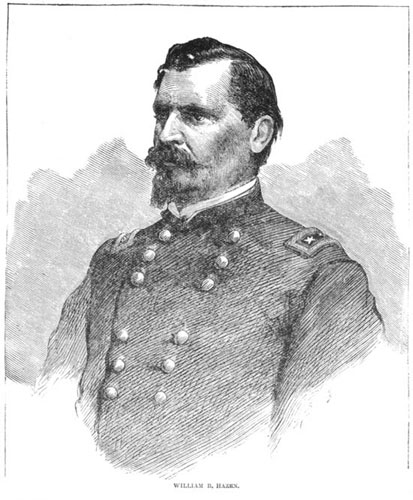Introduction | General Hazen | New York Times | Colonel Custer

General William B. Hazen, commanding officer of Fort Buford, wrote letters and articles contending that the northern Great Plains would never support agriculture because of the lack of rainfall and the extreme temperature fluctuations. He published his first public letter (dated January 1, 1874) in the New York Tribune on February 7, 1874. Later, Hazen published a pamphlet titled Our Barren Lands, and a longer, more precise article, titled “The Great Middle Region of the United States,” which was published in the North American Review. You can read the entire North American Review article online from the Cornell University Library.
In his letter to the New York Tribune, Hazen noted that during the summer of 1873 – an exceptionally rainy season – the post garden located on the river bank about two feet above the high water level, produced “potatoes, native corn, cabbage, early–sown turnips, early peas, early beans, beets, carrots, parsnips, salsify, cucumbers, lettuce, radishes and asparagus.” On the other hand, melons, pumpkins and squashes in the post garden did not mature, and tomatoes did not ripen.
Hazen’s comments were published shortly before the Northern Pacific Railroad, then building into northern Dakota Territory, declared bankruptcy. The success of the railroad depended on the appeal of the territory through which it built its line. Hazen believed that farmers who purchased land from the railroad, or claimed a quarter section of land under the Homestead Act, would find that they could not raise a crop every year because of the lack of rainfall, heat, and early frost. The “northern tropical belt” he refers to was the term applied to a region that included Dakota Territory and southern Saskatchewan by writers who stated that the northern Great Plains had “an atmospheric river of heat” that kept the region warm through the Fall.
Here is a brief excerpt (pgs 20 – 22) from Hazen's article:
and a chart of the rainfall records from Fort Buford:
Address:
612 East Boulevard Ave.
Bismarck, North Dakota 58505
Get Directions
Hours:
State Museum and Store: 8 a.m. - 5 p.m. M-F; Sat. & Sun. 10 a.m. - 5 p.m.
We are closed New Year's Day, Easter, Thanksgiving Day, and Christmas Day. We are closed at noon Christmas Eve if it falls on Mon.-Thurs. and are closed all day if it falls on Fri.-Sun.
State Archives: 8 a.m. - 4:30 p.m. M-F, except state holidays; 2nd Sat. of each month, 10 a.m. - 4:30 p.m. Appointments are recommended. To schedule an appointment, please contact us at 701.328.2091 or archives@nd.gov.
State Historical Society offices: 8 a.m. - 5 p.m. M-F, except state holidays.
Contact Us:
phone: 701.328.2666
email: history@nd.gov
Social Media:
See all social media accounts